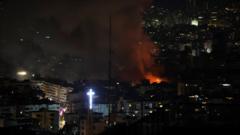In the shadow of continuing violence and blockades, the situation for families in Gaza is growing increasingly dire. With limited access to food and resources, parents are facing the heartbreaking challenge of trying to feed their children amidst ongoing conflict.
**Desperate Struggles: Gaza Families Face Critical Food Shortages Amid Ongoing Conflict**

**Desperate Struggles: Gaza Families Face Critical Food Shortages Amid Ongoing Conflict**
As aid supplies dwindle and restrictions tighten, families in Gaza grapple with an escalating hunger crisis, leaving many parents with an agonizing reality.
As fears of a worsening humanitarian crisis loom, parents in Gaza, like Nour Barda and Heba al-Arqan, struggle to provide basic nourishment for their newborns and toddlers, emphasizing the urgent need for effective aid solutions.
Families in Gaza, such as Nour Barda and Heba al-Arqan, had hoped for brighter possibilities in the midst of a temporary truce in November 2023. With dreams of another child, they believed the worst might be behind them. However, after the birth of their daughter Shadia in April amidst escalating turmoil, the realization of their harsh reality set in as food scarcity intensified drastically. Nour explained that despite Ms. al-Arqan's efforts, there is hardly any nourishment to be provided, and the situation feels increasingly desperate.
Their experience isn't singular—many families were already struggling before Shadia's arrival. Their son Jihad, born in 2023 two weeks post war onset, faced similar challenges of malnutrition. A previous article had documented their struggle to feed him when he was just six months old; now, with two infants to care for, the urgency to find food has reached alarming levels.
The blockade imposed by Israel has now stretched for almost three months, drastically limiting aid and resources. While the blockade was slightly eased in May, the influx of supplies remains far too meager for the needs of the two-million-strong population. The United Nations' traditional delivery systems have unravelled amidst escalating violence, leaving an alternative Israeli-backed system marred in controversy and chaos.
Despite claims of delivering millions of meals, the UN insists that assistance provided is grossly inadequate to meet the staggering need for nourishment among the residents. Security for aid deliveries, now managed by American contractors, still sees Israeli military presence nearby, complicating the situation further. With ongoing violence and restrictions, the hopes of families remain bleak as they continue to struggle for survival.
Families in Gaza, such as Nour Barda and Heba al-Arqan, had hoped for brighter possibilities in the midst of a temporary truce in November 2023. With dreams of another child, they believed the worst might be behind them. However, after the birth of their daughter Shadia in April amidst escalating turmoil, the realization of their harsh reality set in as food scarcity intensified drastically. Nour explained that despite Ms. al-Arqan's efforts, there is hardly any nourishment to be provided, and the situation feels increasingly desperate.
Their experience isn't singular—many families were already struggling before Shadia's arrival. Their son Jihad, born in 2023 two weeks post war onset, faced similar challenges of malnutrition. A previous article had documented their struggle to feed him when he was just six months old; now, with two infants to care for, the urgency to find food has reached alarming levels.
The blockade imposed by Israel has now stretched for almost three months, drastically limiting aid and resources. While the blockade was slightly eased in May, the influx of supplies remains far too meager for the needs of the two-million-strong population. The United Nations' traditional delivery systems have unravelled amidst escalating violence, leaving an alternative Israeli-backed system marred in controversy and chaos.
Despite claims of delivering millions of meals, the UN insists that assistance provided is grossly inadequate to meet the staggering need for nourishment among the residents. Security for aid deliveries, now managed by American contractors, still sees Israeli military presence nearby, complicating the situation further. With ongoing violence and restrictions, the hopes of families remain bleak as they continue to struggle for survival.





















